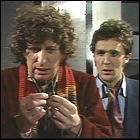 The Doctor, Sarah and Harry are waylaid by a secret arm of the Time Lords en route back to space station Nerva. A Time Lord has diverted them to Skaro, the Daleks’ homeworld, on the eve of their creation, and the Doctor is under orders to prevent the creation of the Daleks in order to avoid future in which they could conquer the entire universe. An atomic war between the Kaleds and the Thals has reduced both of Skaro’s superpowers from the nuclear age to the stone age, with the exception of the radiation-deformed Kaled genius Davros, who not only anticipates the mutation of his people that the war will cause, but embraces it as their future. Davros has devised armored life support systems to encase the shriveled mutants that the Kaleds will become after centuries of atomic bombardment – and he christens these devices Daleks. The Doctor, Harry and Sarah stumble into the Kaled city, and find that Davros has fanatical sympathizers as well as horrified opponents among his own people. And when the moment comes, despite the evil and hatred that Davros is preprogramming into his creations, the Doctor finds that there may be a just reason to allow the Daleks to run their destructive course through history.
The Doctor, Sarah and Harry are waylaid by a secret arm of the Time Lords en route back to space station Nerva. A Time Lord has diverted them to Skaro, the Daleks’ homeworld, on the eve of their creation, and the Doctor is under orders to prevent the creation of the Daleks in order to avoid future in which they could conquer the entire universe. An atomic war between the Kaleds and the Thals has reduced both of Skaro’s superpowers from the nuclear age to the stone age, with the exception of the radiation-deformed Kaled genius Davros, who not only anticipates the mutation of his people that the war will cause, but embraces it as their future. Davros has devised armored life support systems to encase the shriveled mutants that the Kaleds will become after centuries of atomic bombardment – and he christens these devices Daleks. The Doctor, Harry and Sarah stumble into the Kaled city, and find that Davros has fanatical sympathizers as well as horrified opponents among his own people. And when the moment comes, despite the evil and hatred that Davros is preprogramming into his creations, the Doctor finds that there may be a just reason to allow the Daleks to run their destructive course through history.
written by Terry Nation
directed by David Maloney
music by Dudley SimpsonGuest Cast: Michael Wisher (Davros), John Scott Martin, Max Faulkner, Keith Ashley, Cy Town (Daleks), Roy Skelton (Dalek voices), Peter Miles (Nyder), Guy Siner (Ravon), Dennis Chinnery (Gharman), Richard Reeves (Kaled Leader), John Franklyn-Robbins (Time Lord), Stephen Yardley (Sevrin), James Garbutt (Ronson), Drew Wood (Tane), Jeremy Chandler (Gerrill), Pat Gorman, Hilary Minster, John Gleeson (Thal soldiers), Andrew Johns (Kravos), Peter Mantle (Kaled guard), Harriet Philpin (Bettan), Max Faulkner (Thal guard), Michael Lynch (Thal politician), Ivor Roberts (Mogren), Tom Georgeson (Kavell)
Broadcast from March 8 through April 12, 1975
LogBook entry & review by Earl Green
Review: It sometimes seems to take ages to get there, but Genesis Of The Daleks is one of the most outstandingly intelligent and mature stories in the history of Doctor Who. Virtually every prior Dalek-related adventure took the stance that the Daleks were Evil incarnate, and therefore must be destroyed. But in this case, the Doctor realizes that resistance against the Daleks could have the beneficial side-effect of causing enemies to settle their differences and fight the Daleks as allies. Though the price of that truce may be thousands or even millions of lives, the resulting peace might just be worth it. Would any of us make the same call? It’s a concept that certainly begs for extended debate.
 Genesis‘ other great contribution to the Doctor Who mythos is Davros, the creator of the Daleks. Horribly injured in previous nuclear attacks, Davros relies on a self-contained life support wheelchair for his survival – and that chair is remarkably similar to the bottom half of a Dalek casing. Davros takes a permanent position that had been filled in previous shows by puppet dictators, allies, and slaves of the Daleks – he can deliver the Dalek credo faster than five words a minute. Michael Wisher does a fantastic job as Davros, and he set a standard of subtle menace that neither of his successors in the role ever quite lived up to. Peter Miles and Guy Siner also turn in impressive performances.
Genesis‘ other great contribution to the Doctor Who mythos is Davros, the creator of the Daleks. Horribly injured in previous nuclear attacks, Davros relies on a self-contained life support wheelchair for his survival – and that chair is remarkably similar to the bottom half of a Dalek casing. Davros takes a permanent position that had been filled in previous shows by puppet dictators, allies, and slaves of the Daleks – he can deliver the Dalek credo faster than five words a minute. Michael Wisher does a fantastic job as Davros, and he set a standard of subtle menace that neither of his successors in the role ever quite lived up to. Peter Miles and Guy Siner also turn in impressive performances.
The plot seems to take a detour for the sake of padding the story out to six episodes when Sarah and a number of slaves are forced to haul rocket and arms components up a dangerous scaffolding, but it’s worth it for the freeze frame cliffhanger in which Sarah plummets – briefly – from her perch.
Genesis Of The Daleks, though it barely features the Daleks, is an incredible and absolutely essential entry in the history of Doctor Who.

